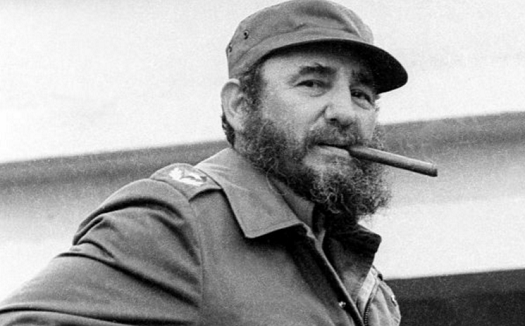Commentary: How Will Castro’s Death Impact Cigars?
28 Nov 2016

By now you most assuredly know that Fidel Castro—the communist revolutionary who overthrew Cuban President Fulgencio Batista via guerrilla warfare in 1959 and ruled the island nation as a totalitarian dictator until 2006, when he installed his brother at the helm—died on Friday, November 25. He was 90 years old.
Castro’s legacy will be a complicated one. The myriad narratives will be shaped by the biases of the authors who document his life, and by the millions of people who will either mourn or celebrate his demise. These threads of opinion will not abide national boundaries, either; consider that, even among Cubans themselves, there will be those who benefited from Castro’s socialist state, while others did not fare so well.
Those who lost their businesses, land, homes, and even family members will not remember El Presidente fondly. I don’t need to remind you that human rights violations were—and still are—not uncommon under the Castro regime. Consider the following summary of Fidel’s time in power, courtesy of the Washington Post: “It began with mass summary executions of Batista officials and soon progressed to internment of thousands of gay men and lesbians; systematic, block-by-block surveillance of the entire citizenry; repeated purges, complete with show trials and executions, of the ruling party; and punishment for dissident artists, writers, and journalists. Mr. Castro’s regime learned from the totalitarian patron he chose to offset the U.S. adversary—the Soviet Union, whose offensive nuclear missiles he welcomed, bringing the world to the brink of armageddon. Mr. Castro sponsored violent subversive movements in half a dozen Latin American countries and even in his dotage helped steer Venezuela to economic and political catastrophe through his patronage of Hugo Chávez.â€
I have my own biases about Fidel Castro. While I do not harbor any personal connection to Cuba, I believe humans flourish in free societies, and the proper role of government is to be limited in power and scope, enabling individuals and businesses to interact with one another on voluntary terms. Cuba lies but 90 miles from America’s shores, yet it serves as a tragic example of the impacts of a politically and economically overarching government. You will not count me among those mourning Castro.
My opinion of the late dictator hardly matters, though. If you’re reading this, you might be wondering what Castro’s death means for your future ability to acquire Cuban cigars—or, perhaps more interestingly, if this event will somehow expedite the ability of non-Cuban cigar makers to start including Cuban tobacco in their blends (assuming this isn’t already happening under-the-radar). Crass as it may seem to think of cigars at a time like this, StogieGuys.com is, after all, a cigar website.
On one hand, perhaps not much will change. Fidel Castro hasn’t been officially running the country for a decade (his brother, Raúl Castro, was appointed presidential powers in 2006). And even though Congress is unlikely to change its tune on the longstanding embargo, recall that President Obama—via executive order—has made it legal to bring back cigars purchased in Cuba or elsewhere, as long as the cigars are for personal consumption. This was the latest step in the gradual progress of diplomatic normalization that also included the reestablishment of embassies in Havana and Washington.
That said, President-elect Trump made promises to reverse the wheels Obama set in motion. “The death of Fidel Castro is putting unexpected pressure on [Trump] to follow through on earlier promises,†reports the Wall Street Journal. “Mr. Trump’s top aides said Sunday that he would demand the release of political prisoners held in Cuba and push the government to allow more religious and economic freedoms. Reince Priebus, Mr. Trump’s incoming White House chief of staff, said the president-elect ‘absolutely’ would reverse Mr. Obama’s policies if he didn’t get what he wanted from Cuba.†Still, Trump “could face pushback from U.S. companies now deeply invested in Cuba under the current administration’s policy. Those companies include major airlines, hotel operators, and technology providers, while big U.S. phone carriers have signed roaming agreements on the island.â€
Time will tell how the new administration in Washington reacts to the various competing interests related to Cuba. There are plenty of issues and conflicts at play, and cigars are unlikely to be top of the agenda. For now, what seems certain is that the people of Cuba will continue to live under a regime whose main business is the promulgation of extreme political and economic repression. There was a one-party, socialist state during Fidel Castro’s reign; there is a one-party, socialist state with his brother at the helm; and, barring a new revolution, there will likely be a one-party, socialist state long after the 85-year-old Raúl Castro is gone.
photo credit:Â Flickr

 Patrick Ashby
Co-Founder & Editor in Chief
Patrick Ashby
Co-Founder & Editor in Chief Patrick Semmens
Co-Founder & Publisher
Patrick Semmens
Co-Founder & Publisher George Edmonson
Tampa Bureau Chief
George Edmonson
Tampa Bureau Chief
Very well-written. The health care and education reforms Castro brought to the island were just silver lining on a very dark cloud of dictatorship. This man was a thug and deserves to be remembered as such.
How this may impact cigars is an interesting question. While I never much cared for Cuban cigars, I welcomed the recent changes and was looking forward to easier access to Cuban tobacco. We’ll see if Trump follows through on his promises, or if the Castro regime loosens its grip.
Twitty Bird elect, a backwards thinking man, threatens to roll back Obama’s plans for allowing Cuba into the 21st Century. This will indeed affect the cigar industry. As for Fidel Castro the man, he is no longer an issue.